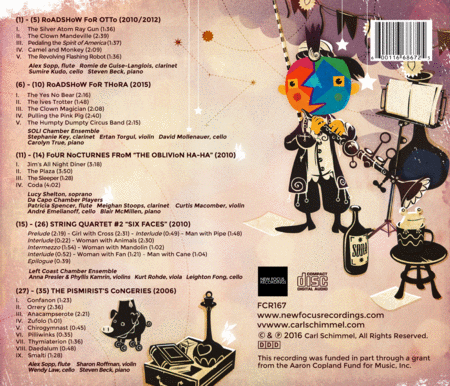Roadshow: Music of Carl Schimmel
Details
Description
SKU: NX.FCR167
By Alex Sopp, Da Capo Chamber Players, Left Coast Chamber Ensemble, Lucy Shelton, Romie deGuise-Langlois, SOLI Chamber Ensemble, Sharon Roffman, Steven Beck, Sumire Kudo, and Wendy Law. By Carl Schimmel. Country of Origin: United States. Classical. CD (1 disc). Published by Naxos (NX.FCR167).UPC: 600116686725.
Carl Schimmel's music possesses a Haydesque structural sensibility augmented with a playful sense of humor. His wonderful ability to communicate semantic meaning from moment to moment gives his scores an engaging narrative, and his penchant fo rminiatures fits perfectly wit hhis colorful depiction of different characters. He is influenced deeply by literature and a background in mathematics. Both of Schimmel's "Roadshow" pieces are written for his children, one for his son Otto and the other for his daughter Thora. Schimmel was inspired by the hit PBS show "Antiques Roadshow," and each miniature movement is a musical imagining of how his children might play with toys he saw featured on thes how. The first track of the recording, "Silver Atom Ray Gun" from Roadshow for Otto, with its bravura opening and maudlin asides, encapsulates Schimmel's occasionally cartoonish presentation. The opening movement Four Nocturnes from "The Oblivion Ha-Ha" sets poetry by James Tate, an American poet whose surrealist imagery veered toward the absurd later in his career. Schimmel's style of setting the text here verges closer to recitative than lieder, and an attentive listener might hear references to Debussy in the final movement. The six movements of his String Quartet No. 2 are inspired by cubist paintings that Schimmel then incorporates as characters in the piece (the paintings are y Braque, Picasso, Gleizes, Gris, Metzinger and Leger). Like a cubist painting, the piece's six portrait movements form six sides of the same complex entity, perhaps even facets of a single personality. The final work on the recording, The Pismirist's Congeries, returns to something of the light character of the "Roadshow" pair. A "pismirist" is someone who collects small, insignificant things, and each movement of this work is named after a different keepsake, such as "orrery" (a clockwork model of the solar system) or "zufalo" (a small flute used to train songbirds). This collection, Schimmel's debut full length release, shows the composer at his best, writing intricate, expressive music that balances wit and pathos.

 Share
Share